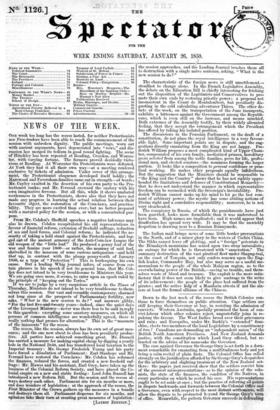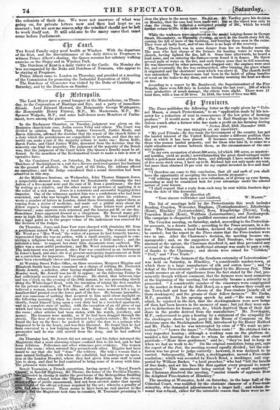Down to the last week of the recess the British
Colonies con- tinue to force themselves on public attention. Cape settlers are still keeping their Governor at bay, in resisting the admission of convicts. Western Australia, specially promised the boon of con- vict-labour which other colonies rejectungratefully joins in re- pulsing the favour. The West Indies brood over their grievances and ruin ; and Essequibo, under Mr. Barkly's "extended" fran- chise, elects two members of the local Legislature by a constituency of two ! Canadians are demanding an "independent union" of the Blitish North American Provinces. And New Zealand demands justice, with the constitution which Lord Grey offered, but re- &acted on the advice of his namesake the Governor.
• The ease against-Governor Sir George Grey is set forth in a docu- ment remarkable for emanating from a multitudinous body and yet being a calm recital of plain facts. The Colonial Office has relied strongly on the justification afforded by Sir George Grey's despatches for the arbitrary and slighting treatment of the New Zealand set- tiers: the papers just received show that the settlers convict him of the grossest misrepresentations—as to the opinion of the colo- nists, the state of the finances, the condition of the Natives, in every particular on which he rested his ease. His representations ought to be set aside at once; • but the practice of referring all points in dispute backwards and forwards between the Colonial Office and a Governor, even with respect to the most distant settlements, will allow the dispute to be protracted beyond Sir George Grey's term of office. Meanwhile, the pattern Governor succeeds in defrauding
the colonists of their due. We were not nnaware of what was going on, for private letters now and then had kept us au courant ; but we sawn') reason-why the mischief should not be lett to work itself out. It will add...one to the many eases that mast come before Parliament.



























 Previous page
Previous page